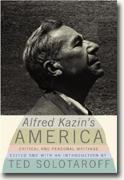Alfred Kazin
book reviews:
· general fiction
· chick lit/romance
· sci-fi/fantasy
· graphic novels
· nonfiction
· audio books
· author interviews
· children's books @
curledupkids.com
· DVD reviews @
curledupdvd.com
newsletter
win books
buy online
links
home
for authors
& publishers
for reviewers

 |
Alfred Kazin's America: Critical and Personal Writings Alfred Kazin HarperCollins Hardcover 592 pages September 2003 |
|
Alfred Kazin was a literary critic, author, historian of culture, and a man who always kept a journal. He loved America, all the more for being the son of immigrants and a dedicated leftist who saw in the Holocaust "the ultimate horror" that "unhinged me from my old progressive beliefs."
He was to say of himself, "forty and more years ago, when I began practicing this peculiar trade of criticism, I had the good fortune to fall in love with a then unfashionable subject, American literature." It is his gift of great prose that shines like a badge of honor through every word of this collection, mirrored by his genuine zeal for the material. He believed that a good critic must have real opinions, which will then communicate to his reader. In no special order, the essays in Alfred Kazin's America highlight the cultural moods of a nation. They range from the deeply personal, beginning with "The Kitchen," a memoir of childhood tenement life, to his eulogy to Josephine Herbst and an homage paid to Hannah Arendt, a thinker and author whom he greatly admired. His treatment of "all the lost generations" includes such artists as Fitzgerald, Hemingway, ee cummings, Aldous Huxley and Wilfred Owen. All were affected by the war. "Lost and forever writing the history of their loss, they became specialists in anguish; and as they sentimentalized themselves, so they were easily sentimentalized...they were able to convince others that in writing the story of their generation, they were in some sense describing the situation of contemporary humanity." Kazin does not stand apart from these men out of arrogance, but has a vision that encompasses and transcends their work. He describes the inner journey of Abraham Lincoln, who grew into religion as he led the nation through its bloodiest war. "Like all honest men on the subject who value their freedom from orthodoxy, Lincoln had had his doubts about the very existence of God. But he was now president of the United States in the most terrifying crisis." Possibly coming to theology through his conviction that "if slavery is not wrong, nothing is wrong," Lincoln rang the changes, politically, as he evolved into a man wholly ready to free the slaves, and to die a martyr's death on Good Friday. Kazin juxtaposes John Brown and Thoreau, the latter an admirer of the former. He postulates a pent-up violence, a longing for anarchic societal implosion, in Thoreau's spirit. "Brown's attack on Harper's Ferry clearly roused in Thoreau a powerful sense of identification. Apocalypse had come." Kazin depicts Mark Twain as above all a master of the monologue, whose writing had the genuine sound of speech. He makes a canvas of the new style of "non-fiction novel" as he shows in detail how Truman Capote, in his ground-breaking In Cold Blood, creates a mystery out of a set of well-known facts, ordering the tale in a way that makes the re-telling more vibrant than the headlines. And without being unkind, he characterizes Tom Wolfe as a "clever journalist" and most of modern writing to be so marketplace-driven that it has lost its soul. These are opinions, yes, but rational, plausible ones, from the critic who allowed himself to "like what I liked, not to like what I didn't, and to support my critical reactions by formulating aesthetic reasons." Anyone who feeds on the excellent use of our good American language will find something to cherish in these brilliant short essays.
|
|
|
|
 Click here to learn more about this month's sponsor! |
|
| fiction · sf/f · comic books · nonfiction · audio newsletter · free book contest · buy books online review index · links · · authors & publishers reviewers |
|
| site by ELBO Computing Resources, Inc. | |
 In this posthumous publication edited by Ted Solotaroff, we are treated to a Kazin's-eye-view of America - its writers, its statesmen, its intellectual roots and branches. Prolific, almost word-obsessed, Kazin wrote about all the important writers of his century and many who came before.
In this posthumous publication edited by Ted Solotaroff, we are treated to a Kazin's-eye-view of America - its writers, its statesmen, its intellectual roots and branches. Prolific, almost word-obsessed, Kazin wrote about all the important writers of his century and many who came before.